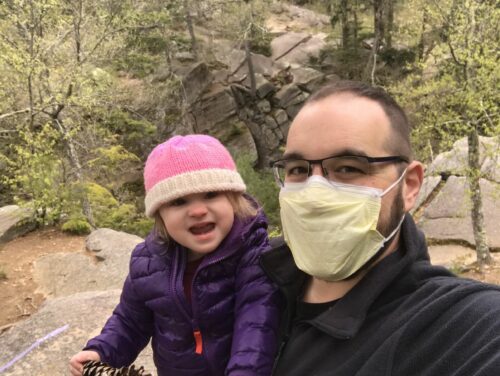Mike Tarselli works as the Scientific Director for SLAS, a global scientific community of 16,000 scientists, engineers, and leaders in the automation, drug screening, and data science fields.

I was honored to be selected as one of Wiki Education’s 2018 Wikipedia Fellows, specifically to help address the gender balance of women in science on the open encyclopedia. This assignment dovetailed well with my personal background – I was raised by a single mom, have a young daughter, and work virtually for a professional team where I’m the only colleague with a Y-chromosome. I also credit a legacy of strong female teachers and managers with providing me guidance throughout my career. My ongoing mission? “To make scientists better through mentorship, education, and enthusiasm.”
Like many other editors, I was shocked on October 2, 2018 – the day of the announcement for the Nobel Prize in Physics, live from Sweden. I’d logged in early in the morning my time to hear the winners, and was shocked to realize that the only female recipient had no public Wikipedia page. So were many others – the page history shows a flurry of edits and 13,000 new bytes of content added in just the first day after the Prize.
This is still a pervasive, if quiet, bias on the platform: Wikipedia tilts heavily towards minutiae in sports, entertainment, and history: Every (male) midfielder on every soccer team worldwide has been profiled, yet prominent women academics or technology leaders with multiple awards and top-shelf degrees has their pages tagged with WP:REL (a measure of relevance to society) upon creation. It wasn’t hard for me to find important female scientists to add; they were everywhere! Indeed, I went on to add or edit over 50 articles over the three months of the program, which together have received (as of this writing) over 100,000 views. Those profiled or updated included NASA explorers, synthetic chemists, start-up founders, authors, and engineers.
I encourage you to get involved if you have an idea or see an inequality you’d like fixed. Editing on Wikipedia can be straightforward – there’s some best practices to be aware of, which is where a program like Wiki Education’s comes in handy. With that background knowledge, it takes passion, research, and about 15 minutes to create a new entry. After that, the entry will continue to grow with new references and crowd-sourced effort.
You actually become a more critical and consistent scientific writer through the process. This is true in three ways. First, you have to find substantive references for everything you include, or it will be speedily edited away or tagged for questioning. That’s the second benefit – real-time peer review by an audience of hundreds of editors worldwide, all of whom have really professional and constructive feedback. And finally, the bar you have to hit to have your article promoted as a “Did You Know?” on the front page is very high caliber – I had two of my articles so recognized, and I probably spent twice the time revising and referencing these that I had in writing the initial copy!
And it’s worth noting that you never know who you’ll influence – with numbers in the billions of reader views annually, Wikipedia really does reach into all corners of the world, and – with appropriate references and context – can sometimes be the most accurate and truthful source on a very complex topic. Such as improving the inclusion of women scientists into the global conversation.
I’m happy for you to reach out to me on LinkedIn or by email sometime to talk more about your passions for science and how to make the world a better place!
Visit learn.wikiedu.org for more information about our Wikipedia training courses.

Well done snd written….insightful.